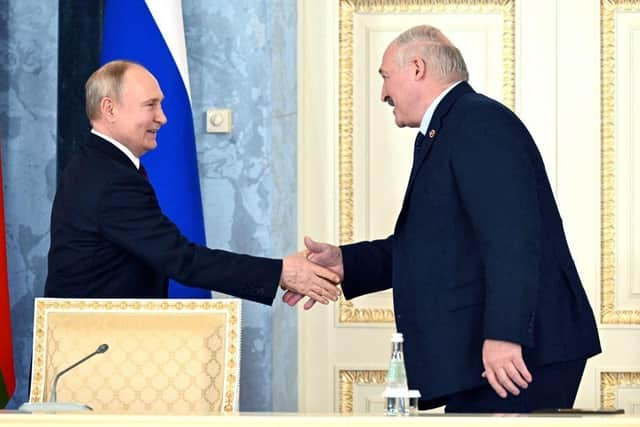Belarus elections: Why the poll results are good news for Russian president Vladimir Putin in war against Ukraine
When Belarusians went to the polls on Sunday, international observers did not expect any dramatic political shift.
Only candidates belonging to the four officially registered parties that are loyal to the country's leader, President Alexander Lukashenko, were allowed to take part in the parliamentary elections to choose the country’s 110 representatives.
Advertisement
Hide AdAdvertisement
Hide AdWhen the results began to come in on Monday, the exact make-up of Belarus’s new parliament was not even announced, so unremarkable was the outcome. Instead, state leaders focused on the turnout, which stood at 74 per cent – and up to 77 per cent in some areas. Social media posts claimed some voters had been “encouraged” to vote by state.


Mr Lukashenko, a close ally of Russian president Vladimir Putin, who is facing his own elections next month, told state news agency BELTA the incumbent government “enjoys the support of more than 87 per cent of people in Belarus”. He said he expected even more people to turn out to vote in the presidential elections, which are due to take place next year.
Mr Lukashenko is set to stand for his seventh term, having ruled the country since 1994.
As an ally of Russia, Belarus is subject to Western sanctions in reaction to the Russian invasion of Ukraine two years ago.
In 2020, the last elections sparked widespread protests in Belarus, lasting months, during which time protesters faced human rights abuses and violence from the authorities.
Opposition candidate Sviatlana Tsikhanouskaya, who stepped in at the last minute after her husband, Siarhei, was arrested by the authorities, was widely believed to have won the majority of the vote. However, Mr Lukashenko claimed victory and she was forced to flee to run what she now calls Belarus’ “government in exile”.
Ms Tsikhanouskaya had called for a boycott of the vote, which she said was a “senseless farce”.
The US has also branded Sunday’s vote a “sham” – and it is unlikely the presidential elections will be any different, meaning Mr Lukashenko will be likely to stay in power for another five years.
Advertisement
Hide AdAdvertisement
Hide AdBelarus, a former Soviet state, is a small country with little military might and is not, in that respect, helpful for Mr Putin. However, its geographic location is – both strategically and as a nearby dumping ground. After the bizarre attempted coup last year when Russian military agency the Wagner Group marched on the Kremlin, Mr Putin moved the organisation to Belarus, where they were said to be training the military.
Belarus has been careful not to allow its own troops to be directly involved in the conflict and was even the location for peace talks early in the conflict,
However, before the start of the invasion, Russian troops performed military drills in Belarus and allowed Russia to launch part of the initial attacks from its Belarusian border with Ukraine, which is close to Kyiv.
Keeping a Belarusian government close is undoubtedly a boon for Mr Putin.
Comments
Want to join the conversation? Please or to comment on this article.
